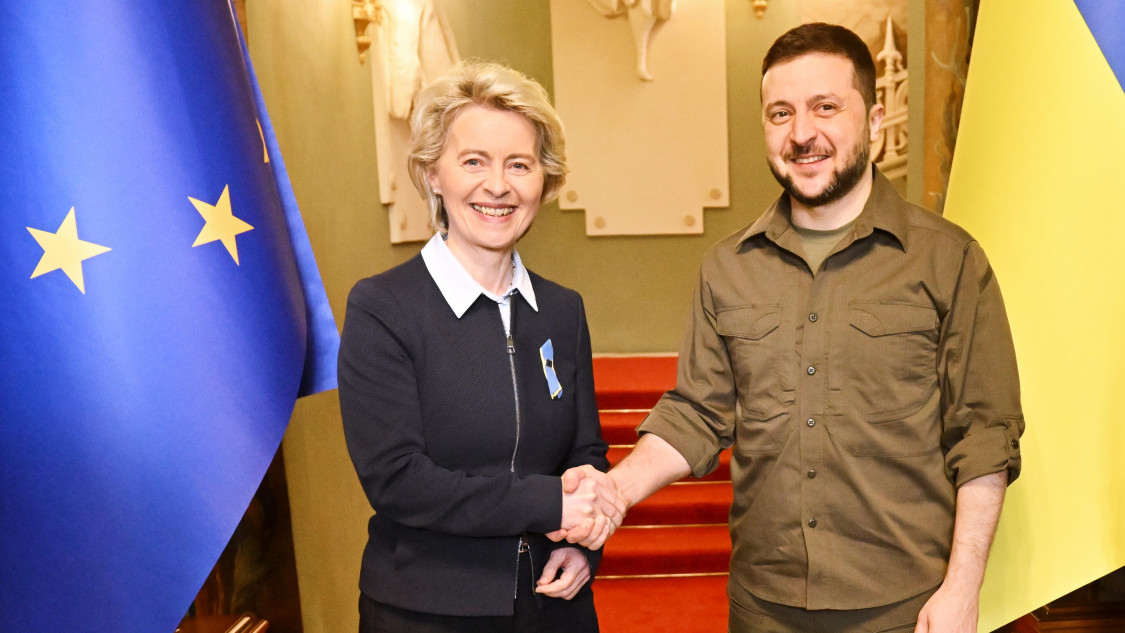Ursula von der Leyen promised the European Commission's position on Ukraine's membership by this week. The Commission is expected to recommend the start of the accession process, even though...
The reality is that there is no realistic chance for Ukraine to join the EU. But telling the truth has somehow gone out of fashion in Brussels,
and in its place a political atmosphere devoid of all sanity moved,
which tries to maintain the excitement in the otherwise unlikely Ukrainian accession debate.
Ukraine's accession to the EU has been a topic among EU countries for a long, long time. The confrontation with the Russians and the military conflicts have always amplified these voices, but no concrete progress has been made in the matter. Not by chance. Ukraine was not eligible for EU membership even before the war, but even before the annexation of Crimea. Since then, the situation has only worsened from a legal and political point of view, yet there is active discourse about an accelerated procedure or out-of-order accession. From here on, this is a political category - that is, a political position, a political debate and a political decision are expected.
"Joining the European Union is a complex process, it does not happen overnight. A country that fulfills the conditions of membership and wishes to join must incorporate EU legislation into its legal system in all policy areas," states the first sentence of the summary of EU accession website If we take the statement literally, then
based on the requirements of the EU, Ukraine's quick, out-of-order accession can be ruled out from the outset.
Of course, it costs nothing to rewrite one paragraph of an online article. So let's take a look at the strategic regulations and specific criteria for joining! Let's start with the strategy:
A prominent element of the consensus adopted on the enlargement strategy is "the consolidation of EU commitments made in connection with the ongoing accession negotiations". There are currently several negotiations on the admission of new members: the EU currently has five candidate members and two potential candidate members, Ukraine does not belong to either category. Handling Ukrainian accession in an accelerated procedure, possibly out of line
it would jeopardize the accession negotiations that are already underway,
which is contrary to the first point of the enlargement strategy and the fundamental interests of the EU.
Favoring Ukraine would not meet the requirement of "the application of a fair and strict system of conditions at all stages of negotiations with candidate countries". The referenced set of conditions is contained in the so-called Copenhagen criteria. These include a functioning market economy, the existence of a stable democracy and the rule of law, as well as the acceptance of the EU legislation, including the conditions for the euro, by the country wishing to join.
One can hardly speak of a functioning market economy in the case of a war-torn country. Similar questions arise in the case of the functioning democracy criterion - which could not quite meet these expectations even before the war (there have been reports of systemic corruption risks, an unpredictable legal environment, violations of minority rights and other significant problems in recent years).
One of the basic elements of a functioning democracy can be considered the exercise of administrative and police-military control over the territory of the state, which is more than impossible in a war situation. In this situation, the adoption of EU legislation and the introduction of the euro can at most be a political statement rather than a decision based on real legal grounds.
In its current state, Ukraine therefore does not meet the Copenhagen criteria.
Continuing with the strategic conditions, giving Ukraine special treatment would also not meet the third strategic requirement, which is about greater transparency and better communication, in order to ensure broad and lasting citizen support for enlargement. In the light of the above, it is easy to see that forcing Ukraine's EU membership would undermine the already strong trust in the EU institutions.
The fourth and last condition is "the ability of the Union to integrate new members". When the 27 countries have not been able to come to an agreement on the issues of Western Balkan expansion for a long time, we can hardly talk about a country torn by battles and currently at war being ready to integrate.
If we take the accession conditions seriously, there is no chance for Ukraine to accede through an accelerated procedure.
However, the excitement is caused by the prevailing mood in Brussels, which in the current situation is ready to set aside all rationality, rules and fundamental interests when it comes to Ukraine.
Reality dictates that the war should be ended first, the country should be rebuilt and then EU membership could be debated. In these steps, the EU could provide more help, but talking about facts is no longer cool, telling the truth has somehow gone out of fashion in Brussels.
Featured image: EU Commission / Pool/Anadolu Agency via Getty Images












